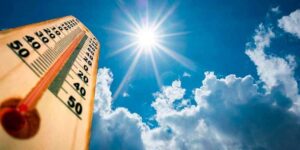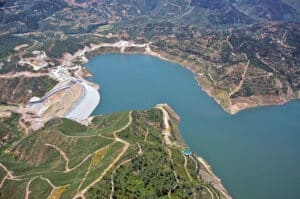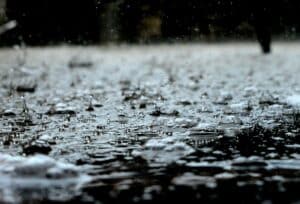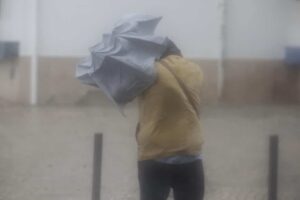Algarve resorts sizzled last weekend as the region reached record temperature highs.
In Beja, traditionally the hottest place in Portugal in the summer, the temperature rose to 44 degrees. Across the border, in Seville, the temperature rose to 49 degrees. But weathermen were shocked to find that parts of the Algarve, usually cooler than the Alentejo in the summer due to its proximity to the ocean, had actually topped Beja on the thermometer.
The Portuguese Meteorological Institute confirmed that Faro reached 44.4 Celsius (112 Fahrenheit) and Vila Real de Santo António and Portimão were only fractionally lower, both setting records and easily eclipsing the previous record of 39 Celsius set in 1975. Even the normally temperate Atlantic islands of Madeira recorded a high of 38 degrees Celsius (100 degrees Fahrenheit).
Children and the elderly were deemed to be most at risk from the heat. The high temperatures in the Alentejo caused five people to register at Beja’s District Hospital with symptoms of dehydration. But the Clinical Director of Beja Hospital, Adelaide Belo, said “it is not an unusual situation for the time of year”.
In the Algarve, on the other hand, the heatwave seemed to catch many weather experts off guard. Internet forecasts remained resolutely at around the 33 Celsius mark (91 Fahrenheit) as the maximum forecast for the weekend. In fact, the maximum recorded in many Algarve coastal areas was a full 20 Fahrenheit higher than that.
In Faro, children resorted to playing in the fountains in Largo de S.Francisco and beaches across the coast were packed.
Cooler time ahead
A spokesman from the Portuguese Meteorological Institute told The Resident that temperatures were expected to drop over the first few days of the week, but only gradually, down to a maximum of 37 degrees on Monday and into the low 30s by the end of the week. “Average daytime highs for this time of year are usually around 29 Celsius (84 Fahrenheit),” the spokesman told us. “But of course averages are deceptive and mask periods of intense heat and also cooler spells.”
Statistics usually show that the Algarve has a more temperate climate than most other destinations of similar latitude. Hence, average summer highs tend to be slightly lower than those of the Greek islands, the Costa Del Sol, the Costa Blanca, the Balearic Islands, Malta and Cyprus and many other Mediterranean hotspots. But the last two summers seem to be breaking with that tradition.
The high temperatures recorded in Setúbal and Santarém, Portalegre, Evora, Beja and Faro led the Director-General of Health to place these areas under Orange Alert, the second highest national warning code. The districts of Bragança, Vila Real, Braga, Guarda, Viseu, Coimbra, Leiria, Castelo Branco and Lisbon were placed on Yellow Alert, the third on the scale.
As always, health officials have warned people to avoid direct exposure to the sun between 11am and 4pm and to pay special attention to babies, the elderly and pets. People were advised to drink plenty of water, even if they do not feel thirsty. But they were also warned to avoid alcoholic and high-sugar drinks that could contribute to dehydration.


















